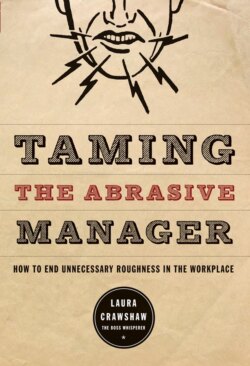Читать книгу Taming the Abrasive Manager - Laura Crawshaw - Страница 27
Additional Reflections
ОглавлениеAdequate bosses treat coworkers (including their subordinates) with respect. They may make unpopular decisions that are hard to swallow, but their interactions with others are consistently courteous. An adequate boss’s decision to transfer your group to your company’s Siberian division may have a negative impact on your career and family, but if it is made for reasons of business need (as opposed to retaliation) and conveyed respectfully, you’re dealing with an adequate boss: ‘‘I didn’t always agree with his decisions, but he was okay to work for.’’
Annoying bosses, although irritating, do no harm, unlike abrasive bosses who inflict interpersonal injury. I am frequently challenged on this point: ‘‘So what’s your definition of harm? Behaviors that harm one person may not even irritate another—so where do you draw the line?’’ Let’s consider that question in light of a specific behavior: the act of interruption, variously perceived as acceptable, annoying, or abrasive, depending on whom you talk to. Personally, I don’t mind being interrupted. Yes, it’s aggressive behavior, but I enjoy vigorous conversations where participants feel free to challenge each other and express their passion. I also know people who hate being interrupted, who perceive it as rude and controlling. Who is right? Surprise: everyone is right, for perception lies in the eye of the beholder. I may perceive the interrupter as harmless and relish the prospect of a stimulating conversation, whereas another perceiver may feel harmed and experience resentment. Our differing perceptions are both ‘‘right.’’
So how do we draw the line between harmless and harmful? How do we resolve this perceptual paradox to determine whether a boss is abrasive, or just annoying? Do we poll the workforce for a consensus vote on harmful versus harmless? Flip a coin? Ask the boss in question for his or her opinion? It’s a good question, and one that I originally struggled with, but in the absence of any better options, I settled on the following definition of abrasive, or harmful, workplace behavior: any aggressive interpersonal behavior that causes emotional distress in coworkers sufficient to disrupt organizational functioning.
In this definition the boss whose aggressive social behaviors disrupt the smooth flow of work is an abrasive boss. This definition allows for variations in work cultures, for what is acceptable in one culture may be destructive in another. Fishmongers at Seattle’s Pike Place Market happily shout and throw fish at each other, but I can assure you that shouting and throwing surgical instruments wouldn’t be viewed as positively in hospital operating rooms. I’ve coached many bosses whose behaviors were perfectly appropriate in one work environment (most notably, the military) but proved disastrous in another. Abrasion is defined contextually, in the eyes of the beholder; however, workplace abrasion is distinctive in that it causes sufficient emotional distress to disrupt operations—work no longer works.
